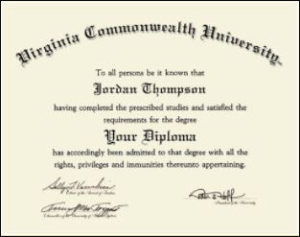 Virginia’s colleges and universities produced a record number of graduates with bachelor’s degrees in Virginia in 2016-17, reports the State Council of Higher Education for Virginia (SCHEV). Of the 54,508 bachelor’s degrees awarded, 24,405 degrees were in STEM disciplines (science, technology, engineering, and math).
Virginia’s colleges and universities produced a record number of graduates with bachelor’s degrees in Virginia in 2016-17, reports the State Council of Higher Education for Virginia (SCHEV). Of the 54,508 bachelor’s degrees awarded, 24,405 degrees were in STEM disciplines (science, technology, engineering, and math).
Virginia continues to make progress on the Virginia Plan for Higher Education, which aims to make the Old Dominion the best educated state in the country by 2030. To attain that goal, the percentage of Virginians with a college degree or workforce credential must increase from 51% to 70%.
“Of all the jobs created since the Great Recession, 99% of them went to individuals with more than a high school diploma,” said SCHEV Director Peter Blake. “This can be in the form of worker training, credentials or degrees. The Commonwealth needs a well-educated workforce to succeed in the world economy. Virginians need to keep their skills sharp to succeed in work and life.”
Defying the ever-escalating cost of attendance, undergraduate enrollment at Virginia’s public four-year institutions increased 2% over the previous year, reaching 174,032.
“Baccalaureate enrollment has set record levels for 25 years,” wrote Todd Massa, director of policy research, in a report to the council. “Even with dramatic changes at individual institutions, Virginia public higher education remains a highly desired destination.”
With 36,297 students enrolling for the 2017-18 school year, George Mason University was the largest four-year institution in Virginia. Virginia Tech was second largest, with 34,440, followed by Virginia Commonwealth University with 31,036.
Bacon’s bottom line: Virginia’s public colleges keep on raising tuition, but they keep on growing. I’ve been warning that the cost of attendance can’t continue climbing as it has in recent decades without pricing students out of the market. So far, Virginia’s higher-ed system has proven me wrong. While institutions have increased the list price of tuition, they have discounted it for students from lower-income families, thus keeping tuition affordable for poorer students.
Still, I maintain there are limits, and we may be seeing them at some institutions. Despite system-wide gains, enrollment declined 5.7% at the University of Virginia’s College at Wise, 2.1% at Norfolk State University, and 0.6% at Virginia Commonwealth University.
Last May the VCU board approved a 3.8% tuition & fee increase for in-state undergraduate students. During the run-up to that decision, I opined that a big tuition hike created a big risk for a non-elite institution like VCU. “The board will need to pay close attention to the market consequences. Will fewer students apply to VCU? Will VCU become less selective in whom it accepts?”
Well, we now know one consequence: VCU ended up with 182 fewer students. I haven’t had a chance to analyze the data but here’s what I would expect: Demand held up for programs where VCU is strong — the School of the Arts, the Brand Center — but eroded badly in disciplines where it is weak. If I have a chance, I’ll dig into the data and report back if I’m right or wrong.


